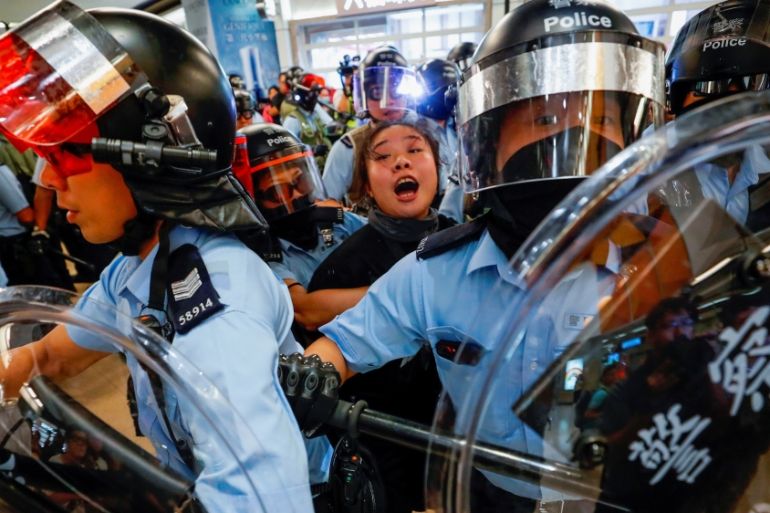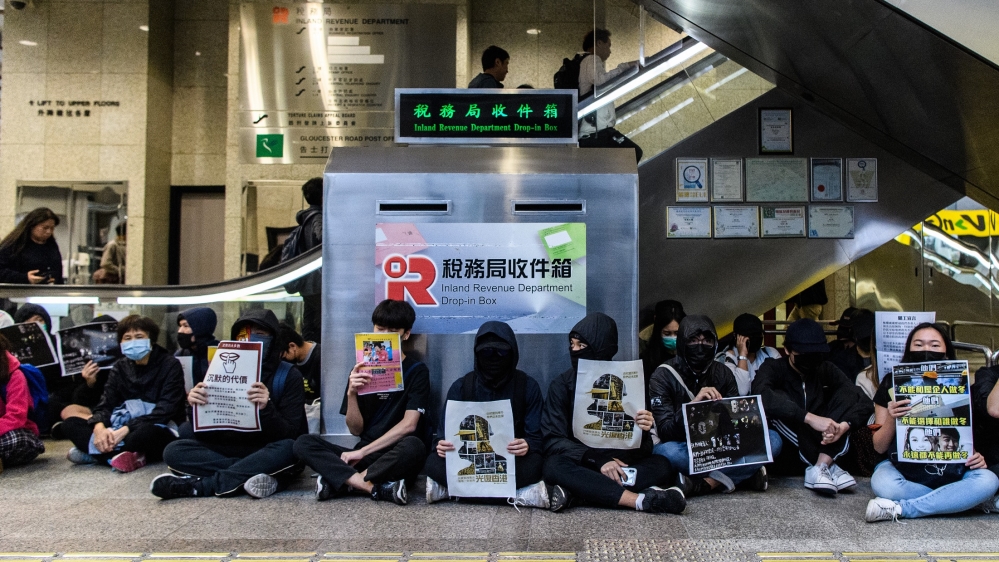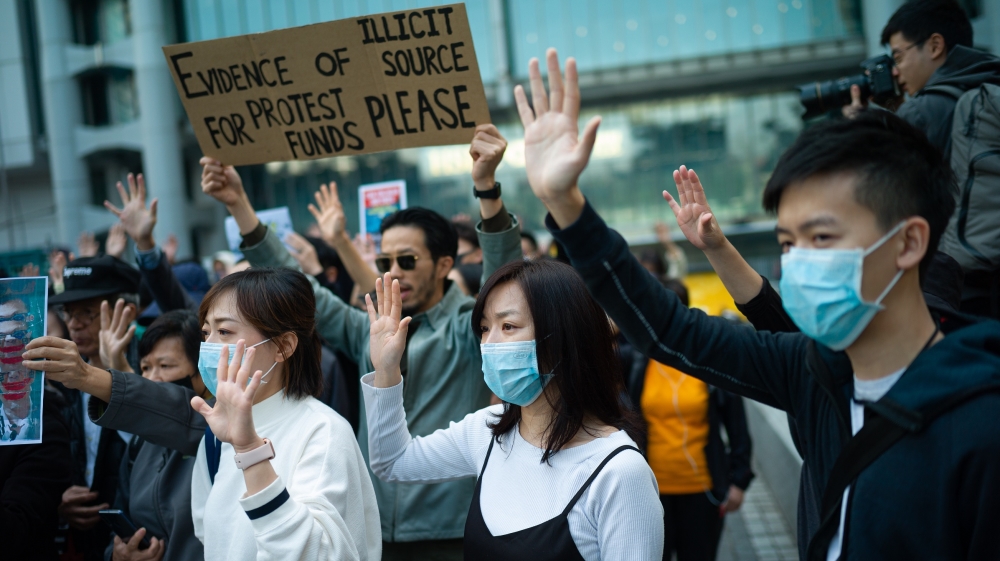For ‘the braves’ there is no turning back in battle for Hong Kong
Young protesters who use violent tactics that set them apart from other demonstrators pose new challenge to authorities.

Hong Kong, China – A Catholic schoolgirl who left a promising career to lob petrol bombs at police. College students whose raison d’etre is to keep the fight going. A protester who beat arrest and won an election.
As Hong Kong‘s anti-government protests have dragged on from summer into winter, these are the kind of people who have emerged as “the braves” – people prepared to use extreme tactics that set them apart from the vast majority of peaceful demonstrators.
Keep reading
list of 3 itemsHong Kong protests flare before Xi meeting with city leader
Hong Kong protesters rally in support of minority Uighurs
“The braves”, whose number is hard to gauge and whose ranks have been replenished by younger and younger protesters give the government the most headaches. Police have branded them rioters determined to round them up in order to quell the unrest.
Few protesters set out to be braves, but nearly all were frustrated by the failure of the Umbrella Movement of 2014, a mass sit-in to demand universal suffrage to elect the full legislature and chief executive. Back then they played in defence and were met with defeat.
|
|
After million-strong marches in June failed to move the government into heeding the people’s demands to withdraw the controversial bill that had set off the protests, more extreme action brought results. The bill was shelved and later scrapped, after protesters stormed the legislature.
“It was [the government] who taught us peaceful protests are useless,” the braves spray-painted on the walls inside.
“This was the breakthrough (that) opened up the space for radical actions,” said Gary Tang, a professor at Hang Seng University who studies youth movements.
“And the process of mutual escalation, between the police and the protesters, where the police are seen to have used disproportionate force, has further solidified sympathy for the braves.”
As the current struggle has become the longest the self-governing Chinese territory has seen in more than half a century, the braves, although bruised and exhausted, say they will keep fighting – while they still can, and while they still enjoy the rights and freedoms of the “one country, two systems” framework, under which the former British colony was returned to China in 1997. Beijing is to assume full control by 2047.
‘Resist now’
“If we don’t resist now, what would happen to us [then]?” asked Christie, 20, who recently recovered from having her pelvis cracked by a pepper-ball grenade from the police.
Since being shot, Christie is easily rattled by loud bangs, but she is just as ready to throw a Molotov cocktail at police; mad at herself whenever she misses.
Before throwing herself into the protests, Christie was a pastry chef at a five-star hotel, earning three times the monthly income of the average university graduate even as a secondary school drop-out.
When the police rang her at work and pressed her to tell on fellow protesters, she quit her job. Her injuries now make it difficult to find employment.
She used to have her own flat. These days, she shuttles between the couch of a politically aligned host family and a bunk bed at an Airbnb rental shared with three fellow protesters to avoid police searches of their family homes.

“For me, there’s no return,” she said. “All we want is for the government to listen to us.”
Once outside, Christie and other braves say they see a “parallel universe,” where business ticks along as usual, and passers-by walk oblivious past the defiant graffiti demanding democracy and heralding “the revolution of our time.”
If only they would make the personal sacrifice, Christie thinks, to go on strike to bring the economy to a halt and the government to its knees.
But she said she can understand. Many people have “baggage”: a mortgage, children, elderly dependent parents.
Middle-class support
That said, Hong Kong’s protest movement could not have lasted as long without broad support from the majority middle-class, who are avowedly non-violent.
They have poured money into the cause, forked out for safe houses and medical treatment, as well as supermarket and fast-food restaurant coupons to keep the protesters fed.
Opinion polls in November suggested twice as many respondents blamed the authorities rather than the protesters for the mounting violence but maintaining that support requires care.
“If the police show restraint and even de-escalate the situation, it remains to be seen how the braves will carry on,” said Tang, the researcher.
“If they use more force than the police, they’d risk crossing the line and losing legitimacy with the non-violent majority. That’s the dilemma they’re likely facing.”

Used to toggling between odd jobs and Triad activities, Jay, 30, has found purpose in the current protests.
He is careful to avoid being caught. His Airbnb hideout is strictly for sleeping and killing time. Other than an “Anonymous” mask and a pair of spent latex gloves, nothing hints at his involvement in protests. His team’s armoury is on a street minded by the Triads.
Jay, too, intuits any escalation of violence must be calibrated.
“You need to wait till somebody is shot and killed on the spot for supporters to think killing the cops becomes fair game – that hasn’t happened yet,” he said.
‘War of resistance’
But in Hong Kong’s leaderless movement, cool heads do not always prevail.
Most often emotions, rather than calculations, push events along. In mid-November in the police siege of the Polytechnic University more than one thousand protesters including many of the braves were trapped after rushing to help their comrades.
|
|
At least a few hundred were arrested, bringing the total to more than 6,000.
If a brave is charged and freed on bail, they generally retreat from the front lines because if they are arrested again, they will have to stay behind bars until their court date.
The siege also allowed the police to seize crucial equipment including goggles and helmets. The shortage of respirator masks means fewer can face-off against police tear gas and grenades.
As police objections to the mass demonstrations stifled turnout among the non-violent demonstrators – the last million-strong march was nearly four months ago – people turned to the ballot box to voice their anger.
In late November, opposition candidates won a landslide victory in district council elections. At least five people known to be among the braves won a seat, including Michael who trounced his opponent, the incumbent from a pro-government labour union.
In his low-income neighbourhood, he has long cultivated a “boy-next-door” image with his mild manner and easy smile, even for those who disagree with his politics.

Joining the system has some benefits: Michael, 28, plans to plough the resources from his district’s discretionary budget into supplying the protesters with protective gear.
While buoyed by his victory, he is more pensive about where the movement goes from here.
“Now we’re at a bottleneck,” he said. “The movement has lost its focus. The protest slogans are sounding a bit hollow.”
In the hotel room he’s called home since discovering three months ago that police were tailing him, Michael and his friends liken the movement to a war of resistance.
“The best we can hope for is to keep the heat up,” Michael said.
“It’s getting more and more like guerrilla warfare. It doesn’t take that many people, but it takes guts. And the goal is to disrupt and destroy.”